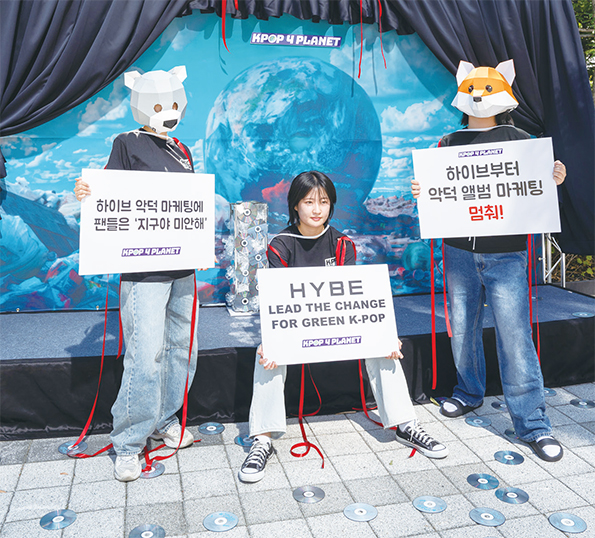
On May 30, photos of discarded albums from K-pop group SEVENTEEN spread on social media platform X, formerly Twitter. This is not the first instance of fans disposing of large quantities of albums. This incident highlights a recurring problem: K-pop’s aggressive marketing strategies encourage fans to purchase multiple copies of albums, driven by random photo cards, event tickets, etc. Remarkably, the reliance on disposable plastics, excessive packaging, and overproduction in album manufacturing poses a significant threat to the environment. According to the Ministry of the Environment, the volume of plastics used for album production has increased every year, reaching 225.2 tons in 2020, 479.0 tons in 2021, and 801.5 tons in 2022.

As the K-pop industry expands globally, album production has soared, exacerbating its negative impact on the environment. Some fans recognize these issues and are working to create a sustainable K-pop culture. These fans go beyond being mere consumers. They actively engage in protecting the environment, responding to the climate crisis, and leading the charge for change. The most prominent organization in this movement is Kpop4Planet, which champions sustainability within the K-pop community. They serve as a platform for fans to take initiative in responding to the climate crisis. CBT interviewed Kim Na-yeon, who is active as a campaigner in the organization.
Q1. What was the founding vision of Kpop4Planet, and what goals does it ultimately pursue?
K-pop fans are more engaged with social issues than commonly recognized. BTS fans, known as ARMY, have funded the planting of a forest named after RM, one of the group members. Furthermore, various fandoms donated to support the victims of a devastating Australian bushfires in 2019. These actions by K-pop fandoms are aligned with environmental advocacy. We wanted to let people know that one does not need the title of environmentalist to protect the Earth; in fact, such actions are already taking place within K-pop fandoms. K-pop fandoms have tremendous power and unity. The power and unity of the K-pop fandom are remarkable. Kpop4Planet began with the idea that, given this influence and cohesion, we could collaborate with fans to address the climate crisis. Our goal is to unite individual voices within the K-pop fandom to create a significant impact in the climate community while learning and growing together to address the climate crisis and facilitate a just energy transition.
Q2. One of the most noteworthy campaigns is No Place for K-pop on a Dead Planet. Please introduce this campaign.
The No Place for K-pop on a Dead Planet Campaign, which started in 2021, called out agencies to change the overall industry of K-pop to be sustainable. We requested that they solve the problem of excessive album waste and hold concerts in sustainable ways. We received about 8,000 hard-to-manage albums from fans and returned them directly to the agencies, requesting that they take full responsibility for the entire process, from production to disposal. After the campaign, they made many eco-friendly efforts; the big 4 K-pop agencies—SM Entertainment, YG Entertainment, JYP Entertainment, and HYBE Co.—published a corporate-sustainability-management report, made a digital flatform album using a QR code, and used eco-friendly paper. Especially, JYP promised the Korean RE100 (Renewable Electricity 100) campaign. This is a positive change for the environment as the agency. However, the significant challenge remains that overproduced and discarded albums and CD will continue to haunt the planet, especially in the streaming era. This is the reason why we restarted an album campaign called Plastic Album Sins in 2024.
Q3. Is there anything that has changed after these activities?
Many K-pop fans regularly stream music to support their favorite artists, and this streaming helps their artists chart on various platforms. However, streaming is very carbon-intensive, as it uses fossil fuels to generate energy to maintain data centers for streaming. We started a campaign named STREAMING HEATING MELTING in 2022. The campaign called out Melon, the biggest music streaming service in Korea which still uses fossil fuels, to convert energy for data centers into renewable energy. Consequently, Melon promised, they would relocate to data clouds that use 100% renewable energy.
Q4. Although media development has made content more accessible, physical albums still offer clear promotional benefits and advantages for consumers. Please tell about the agreements or alternatives that Kpop4Planet is requesting from the agency.
I completely understand that the album contributes to the promotion of the music and delights fans. However, marketing strategies that encourage fans to purchase multiple copies pose serious environmental concerns. This practice leads to the mass production of plastic albums, especially considering that many fans may not even use the CDs. Just looking at an abandoned album in Shibuya Japan in May, this destructive practice to the environment is already spreading overseas. As K-pop grows in influence globally, it is shameful to see such environmentally destructive practices.Therefore, marketing, which induces signing event tickets with purchase of the album, adding various versions of albums, and randomly inserting photocards, should be stopped. Or the agency should find alternatives. Fans are also saying that albums have become not a medium for listening to music, but a means for holding photocards and lotteries for signing event tickets. Corporate profit seeking cannot justify environmental destruction. As ESG (Environmental, Social, and Governance) management becomes increasingly important, such continued behavior will not help their management. Thus, we are bringing up issues and requesting change. After all, it is up to them to find new business models and change somehow. If they are willing to reflect the needs of fans and opinions about a new business model together, Kpop4Planet is ready to have a conversation with them anytime.
Q5. What is Kpop4Planet’s plan from now on?
Kpop4Planet will continuously shine a light on this problem and endeavor to make actual changes with various partners. This year, the issue was frequently highlighted at the parliamentary inspection of the administration. We are preparing to hold a forum to find solutions together with the relevant people at the national assembly on Nov. 20. In addition, we will also continue to convey the opinions through petitions to entertainment companies: stop marketing strategy for albums, disclose greenhouse gas emissions levels related to albums, and establish reduction plans. Please continue to support Kpop4Planet’s various campaign activities.

Thanks to the efforts of fans, the agency has taken positive steps forward. JYP tried to produce albums that uses renewable energy, participating in the Korean RE100 campaign for the first time in the domestic music industry. Day6’s FOREVER and TWICE’s With You-th were produced as digital based albums. Moreover, the albums IM NAYEON by TWICE’s Nayeon, 5-STAR by Stray Kids, and Fe3O4: STICK OUT by NMIXX were produced, using renewable energy generated by a solar photovoltaic power station. These eco-friendly changes were positively estimated. However, there have been cases where eco-friendliness is used as a new marketing strategy, which has led to criticism. For example, JYP has induced fans to make duplicate purchases by including random photocards in products made with eco-friendly materials under the name of Green Project. This has led to controversy over greenwashing.
K-pop industry is paying attentions to the environment, following fans’ demand and social change. However, there is still room for improvement. The problem of marketing that induces the purchase of albums in duplicate has remained. Eventually, it needs cooperation between agencies and fans to achieve intergenerational equity for sustainable growth of the K-pop industry. If they actively step up together and bring about positive changes, K-pop will be an environmentally exemplary case as well as an influential one.

By Kim Ye-kyeong | ykk623315@chungbuk.ac.kr
By Jeong Ha-yeon | hayeon0330@chungbuk.ac.kr



 All
All Feature
Feature






 Kim Ye-kyeong
Kim Ye-kyeong











